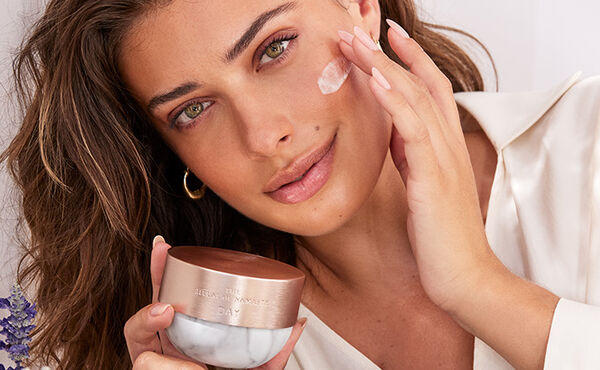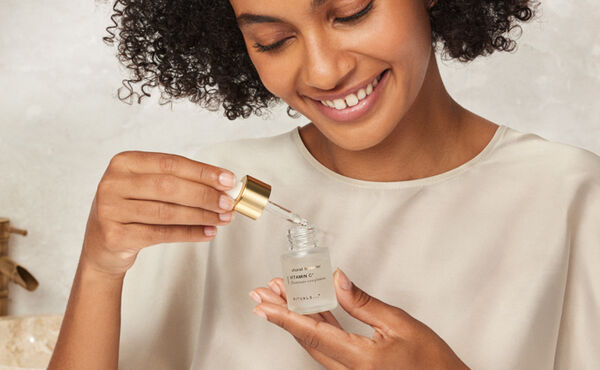There’s a very real possibility that boosting your mood could help combat irritation, inflammation and ageing
If there was ever a catch 22 skincare scenario, this is it. Because while skin conditions can cause mental angst and feelings of stress, the physical impact of stress can trigger ageing and inflammation in the skin, including acne, rosacea, eczema and even psoriasis. So, does that mean altering your mindset could have a knock-on effect and help clear up your complexion? It’s entirely possible.
“The interaction between the brain and skin is key to achieving a healthy complexion,” explains Dr Alia Ahmed, consultant dermatologist and psychodermatologist. “My patients often tell me that their skin is impacting the way they feel and vice versa. In fact, 85% of dermatology patients feel that psychological factors are a major component of their illness and 17% need psychological support to cope with their condition.”
There’s also the scientific evidence to consider. When you’re stressed your levels of cortisol become raised and this can cause an avalanche of problems. “Stress hormone levels correlate with lack of sleep which not only disrupts the process of skin repair overnight, it activates the HPA axis which is associated with an increase in cortisol and is linked to signs of premature ageing like fine lines, reduced elasticity, pigmentation changes, lack of hydration, larger pores, textural changes and changes in blood flow to the skin. It can also affect skin ageing through cell DNA damage as well as causing a rise in glucocorticoids which can reduce the production of hyaluronic acid and so contribute to skin dehydration and a weakened skin barrier,” explains Dr Ahmed. Not much then!
The Magic Of Complexion Mood Boosters
While products can treat some of the skincare chaos at surface level, the real work requires some inner focus and is why psychodermatologists look to holistic management to aid and assist. “There is still a lack of studies that support the link directly, however research exists in this area to show the benefits of some of these techniques – relaxation therapies, mindfulness, CBT, talking therapies etc – in helping to improve overall wellbeing, reduce stress and positively impact coping skills. It may also lead to people treating and perceiving their skin differently, ultimately leading to an improvement in skin signs and symptoms,” continues Dr Alia.
There are also daily practices that Dr Alia recommends to enhance mental wellbeing and dial down any feelings of anxiety. “I treat mind and skin together and not only do I see benefits in my patients’ skin conditions, I hear from them that they are feeling better in their state of mind,” she says.
5 Feel-Good Go-to’s For Skin
Dr Alia reveals the tips and tricks she recommends to her patients to help them think their way to good skin.
1. Manage your environment
I advise my patients to create a feeling of positivity using scents – candles, fragrance sticks, room spray - or music and textures such as soft blankets, throws and cushions. Research shows that a stressful environment with unwanted noise or that’s uncomfortable can affect mental health, so nurture the areas you spend most time in to boost your mental state.

2. Accept your negative emotions
Practicing emotional acceptance will help you manage stress better. So, if it’s your skin that’s causing you concern, work out why - what caused the feeling and if there’s anything that can improve your mood. By not ignoring or rejecting the emotions and questioning the why, you can accept them and free up time to spend engaging in more positive thoughts and activities.
3. Engage in self-dialogue
Remind yourself what you’re thankful for and say positive things about yourself to reframe your thinking and spur on that positive mental attitude. Try this when you’re cleansing your face or applying products because the act of touch is also a self-soother and can promote ‘feel good’ hormones in the body. Click here to try our nighttime cleansing guided meditation.
4. Recognise unhelpful influences
We live in a comparison culture and social media exacerbates the problem. It can create unrealistic expectations of skin with ‘flawless’ finishes. You might not even realise how draining these interactions are, or the impact on your mental health but feel empowered by phasing people or activities out and engage with people who do make you feel good instead.
5. Do what makes you happy
Whether it’s your first cup of coffee in the morning, a voicenote to a friend, a walk in nature or simply relaxing in bed, incorporate as many of your favourite things to do into your daily routine. Just 10 minutes of focusing on yourself instead of rushing around people pleasing can instil a sense of calm, security and build a sense of control which will allow you to handle any stressful situations with poise and positivity.
With psychodermatology a growing field and more research underway looking at the mind-skin connection, it seems that by acknowledging your skin conditions with compassion and trying to keep your mood from fluctuating, you could go some way to reversing the damage without the need for excess products and expensive treatments.
-
View full details$53.00






.jpg?sw=600&sh=370&sm=fit&cx=0&cy=0&cw=600&ch=370&sfrm=jpg)
.jpg?sw=600&sh=370&sm=fit&cx=323&cy=0&cw=722&ch=445&sfrm=jpg)


